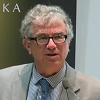The GMO Stigma
STANFORD – In August, at the International Rice Research Institute in the Philippines, a group of activists vandalized test fields of so-called “golden rice,” which has been genetically engineered to contain beta-carotene, a precursor of vitamin A. Some of the perpetrators were even supported by the Swedish government’s International Development Cooperation Agency via its funding of the radical Filipino group MASIPAG.
For poor people whose diet is composed largely of rice – a carbohydrate-rich but vitamin-poor source of calories – “biofortified” strains are invaluable. In developing countries, 200-300 million preschool children are at risk of vitamin A deficiency, which compromises immune systems, increasing the body’s susceptibility to illnesses like measles and diarrheal diseases. Every year, vitamin A deficiency causes blindness in about a half-million children; some 70% of them die within a year.
In September, an eminent group of scientists called upon the scientific community to “stand together in staunch opposition to the violent destruction of required tests on valuable advances, such as golden rice, that have the potential to save millions” of people from “needless suffering and death.” But this passionate appeal fails to address the fundamental problem: the unfounded notion that there is a meaningful difference between “genetically modified organisms” and their conventional counterparts.
The fact is that GMOs and their derivatives do not amount to a “category” of food products. They are neither less safe nor less “natural” than other common foods. Labeling foods derived from GMOs, as some have proposed, thus implies a meaningful difference where none exists – an issue that even regulators have acknowledged.
Humans have been engaging in “genetic modification” through selection and hybridization for millennia. Breeders routinely use radiation or chemical mutagens on seeds to scramble a plant’s DNA and generate new traits.
A half-century of “wide cross” hybridizations, which involve the movement of genes from one species or genus to another, has given rise to plants – including everyday varieties of corn, oats, pumpkin, wheat, black currants, tomatoes, and potatoes – that do not and could not exist in nature. Indeed, with the exception of wild berries, wild game, wild mushrooms, and fish and shellfish, virtually everything in North American and European diets has been genetically improved in some way.
Despite the lack of scientific justification for skepticism about genetically engineered crops – indeed, no cases of harm to humans or disruption to ecosystems have been documented – they have been the most scrutinized foods in human history. The assumption that “genetically engineered” or “genetically modified” is a meaningful – and dangerous – classification has led not only to vandalism of field trials, but also to destruction of laboratories and assaults on researchers.
Moreover, the GMO classification has encouraged unscientific regulatory approaches that are not commensurate with the level of risk, and that, by discriminating against modern molecular genetic-engineering techniques, inhibit agricultural innovation that could reduce strain on the natural environment and enhance global food security. Even as study after study – both formal risk assessments and “real-world” observations – has confirmed the technology’s safety, the regulatory burden placed on GMOs has continued to grow.
This trend is making the testing and development of many crops with commercial and humanitarian potential economically unfeasible. Despite robust laboratory research on plants since the invention of modern genetic-engineering techniques in the early 1970’s, the commercialization of products has lagged.
Unprovoked attention from regulators inevitably stigmatizes any product or technology. Endless discussion of the “coexistence” of genetically engineered and “conventional” organisms has reinforced the stigma, leading activists to pursue frivolous yet damaging litigation. For example, in at least four lawsuits brought against regulators in the United States, judges initially ruled that regulators had failed to comply with the procedural requirements of the US National Environmental Policy Act. And marketing as “natural” products that contain genetically engineered ingredients has led to lawsuits for false labeling.
The discriminatory treatment of GMOs creates widespread mischief. In many places, the location of field trials now must be identified, even including GPS coordinates – a practice that facilitates vandalism. (And activists frequently destroy conventional plants inadvertently, because they are difficult to distinguish from genetically engineered varieties.)
In 1936, the Nobel laureate Max Planck observed that scientific innovations rarely spread as a result of their opponents’ conversion; instead, opponents of innovation “gradually die out,” and the next generation accepts the breakthrough. This was the case with vaccinations and the recognition that DNA is the stuff of heredity – and it will happen eventually with genetic engineering.
Unfortunately, many will suffer needlessly in the interim. As University of California agricultural economist David Zilberman and his colleagues have written, the lost benefits are “irreversible, both in the sense that past harvests have been lower than they would have been if the technology had been introduced and in the sense that yield growth is a cumulative process of which the onset has been delayed.”
As long as today’s activists and regulators remain convinced that GMOs represent a distinct and dangerous category of research and products, genetic engineering will fall short of its potential. That is bad news for the millions of poor people for whom genetic engineering in agriculture, medicine, and environmental science could offer a healthier, more secure future.
Copyright: Project Syndicate, 2014.
www.project-syndicate.org
This article is brought to you by Project Syndicate that is a not for profit organization.
Project Syndicate brings original, engaging, and thought-provoking commentaries by esteemed leaders and thinkers from around the world to readers everywhere. By offering incisive perspectives on our changing world from those who are shaping its economics, politics, science, and culture, Project Syndicate has created an unrivalled venue for informed public debate. Please see: www.project-syndicate.org.
Should you want to support Project Syndicate you can do it by using the PayPal icon below. Your donation is paid to Project Syndicate in full after PayPal has deducted its transaction fee. Facts & Arts neither receives information about your donation nor a commission.




















